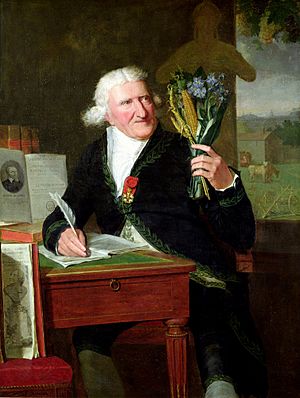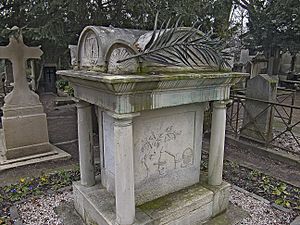Antoine-Augustin Parmentier facts for kids
Quick facts for kids
Antoine-Augustin Parmentier
|
|
|---|---|

Parmentier by François Dumont, in 1812. Behind him is an opened edition of the agronomic treatise Théâtre d'Agriculture, by Olivier de Serres
|
|
| Born | 12 August 1737 |
| Died | 17 December 1813 (aged 76) |
| Resting place | Père Lachaise Cemetery, Paris |
| Citizenship | France |
| Known for | Popularising potatoes in France |
| Scientific career | |
| Fields | Agronomy |
Antoine-Augustin Parmentier (born August 12, 1737 – died December 13, 1813) was a French pharmacist and scientist. He is best known for helping France and Europe discover the potato as a great food source. He also did important work on smallpox vaccinations and finding sugar in sugar beets. Parmentier even started a school for making bread and studied how to keep food fresh, including using refrigeration.
Contents
Life and Career
During a war called the Seven Years' War, Parmentier was an army pharmacist for France. He was captured by the Prussians. While in prison in Prussia, he had to eat potatoes. At that time, French people only knew potatoes as food for animals.
Potatoes first came to Europe from South America in the early 1500s. By 1640, they were in most of Europe. But outside Spain and Ireland, people mostly used them for animal feed. In 1748, France even made a law against growing potatoes. People thought potatoes caused diseases like leprosy. This law stayed until 1772.
When Parmentier returned to Paris in 1763, he began studying food chemistry. His time in prison made him think about potatoes. In 1772, he suggested using potatoes as food for sick people. He won a prize for his idea in 1773.
Thanks to Parmentier's efforts, the Paris Faculty of Medicine said potatoes were safe to eat in 1772. But some people still didn't like the idea. Parmentier was stopped from using his test garden at the Invalides hospital. This was because the religious group who owned the land complained.
In 1779, Parmentier was asked to teach at the Free School of Bakery. His goal was to help make bread more cheaply for Paris. That same year, he wrote a book about how to make potato bread. He showed that it could be just as good as wheat bread.
In 1800, Napoleon Bonaparte made Parmentier the first army pharmacist. He worked hard to make pharmacy as respected as medicine and surgery.
Potato Publicity Stunts
Parmentier then started clever ways to make potatoes popular. He hosted dinners where potato dishes were the main food. Famous guests like Benjamin Franklin and Antoine Lavoisier attended these dinners.
He gave potato blossoms to the king and queen. He also had armed guards watch his potato field during the day. This made people think the potatoes were very valuable. At night, he removed the guards so people would steal the potatoes. This trick helped spread potatoes around. The king, Louis XVI, had given him this land near Neuilly, west of Paris, in 1787.
Acceptance of the Potato
In 1771, Parmentier won a writing contest. All the judges agreed that potatoes were the best replacement for regular flour. At this time, France didn't really need a new food source. So, Parmentier still faced criticism for his work.
The potato finally became accepted in France after a year of bad harvests in 1785. The potatoes, which people had once disliked, helped prevent hunger in northern France. In 1789, Parmentier published a book about growing and using potatoes. This book had the king's official support.
In 1794, a book called La Cuisinière Républicaine (The [Female] Republican Cook) was published. This was the first potato cookbook. It helped make potatoes popular as food for everyone.
Parmentier was interested in many ways to improve people's lives through science. He wrote about making bread, cheese, and storing grains. He also studied using cornmeal and chestnut flour, growing mushrooms, mineral waters, and making wine. He even worked on better sea biscuits for sailors.
Dishes Named After Parmentier
From the 1870s, many potato dishes were named to honor Parmentier. These include:
- Potage Parmentier: a potato and leek soup.
- Hachis Parmentier: a dish like shepherd's pie, with mashed potatoes on top.
- Brandade de morue parmentier: salted cod fish mixed with olive oil and potatoes.
- Pommes Parmentier: cubed potatoes fried in butter.
- Purée Parmentier: mashed potatoes.
- Salade Parmentier: potato salad.
Death and Legacy
Parmentier died on December 13, 1813, when he was 76 years old. He is buried in Père Lachaise Cemetery in Paris. His grave is surrounded by potato plants. A long street in Paris and a metro station are named after him. In his hometown of Montdidier, there is a bronze statue of him. Another large statue of Parmentier is in Neuilly-sur-Seine.
See also
 In Spanish: Antoine Parmentier para niños
In Spanish: Antoine Parmentier para niños
 | Calvin Brent |
 | Walter T. Bailey |
 | Martha Cassell Thompson |
 | Alberta Jeannette Cassell |


